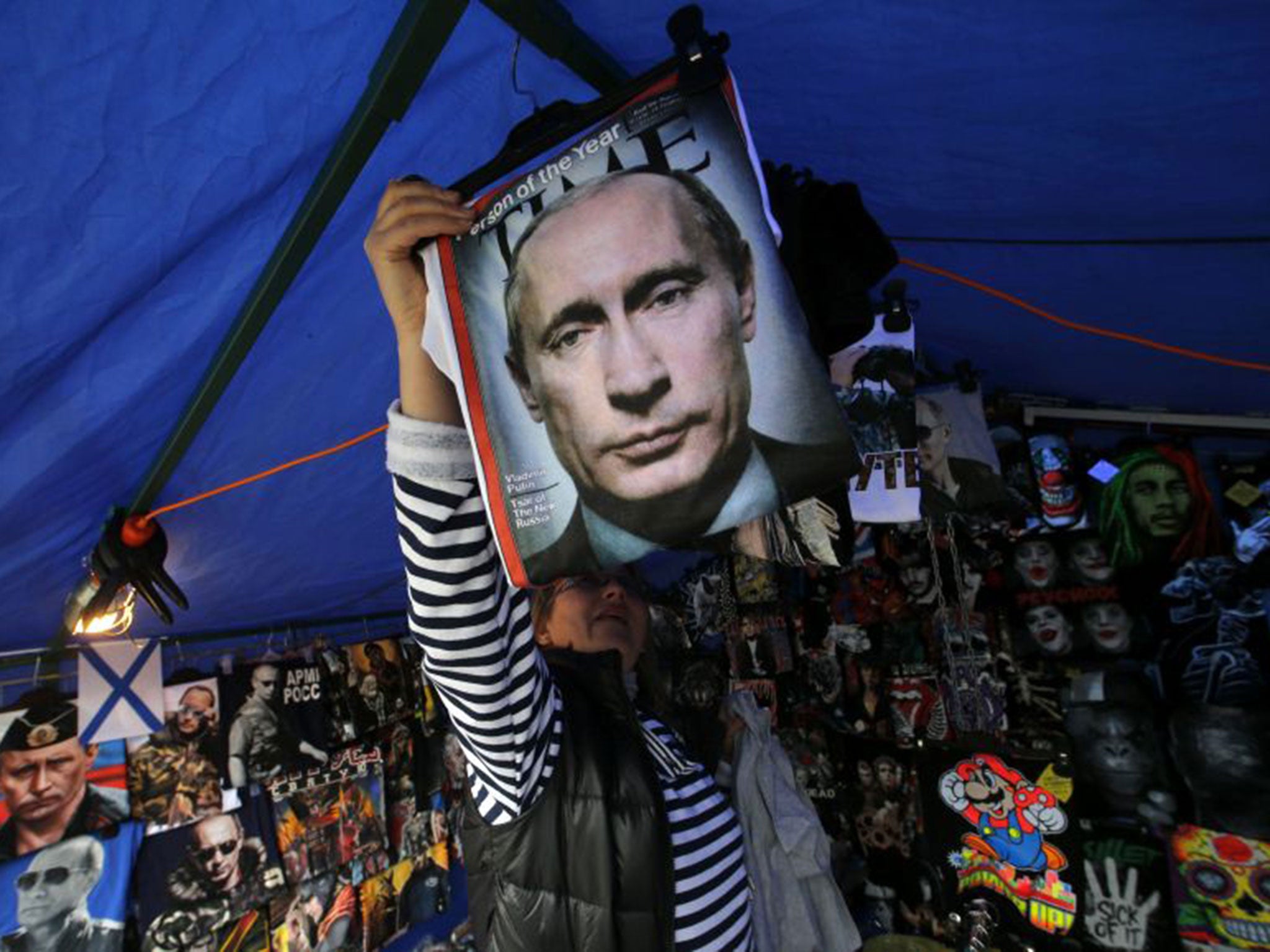Ukraine crisis: Putin pushes the boundaries as EU threatens more sanctions over Kremlin support for rebels
Russian President wants to discuss ‘statehood’ of eastern Ukraine, as America and Europe threaten further sanctions unless the Kremlin withdraws its support for the separatists

Russia’s President, Vladimir Putin, called for immediate talks on the “statehood” of south-east Ukraine on Sunday, using the inflammatory term just hours after the European Union threatened deeper sanctions unless the Kremlin stopped providing troops and assistance to separatists.
His remarks came as reports emerged on Sunday night of Ukrainian soldiers being ambushed and killed after pro-Russian forces allegedly reneged on an agreement to allow them to leave the besieged town of Ilovaisk, 20 miles east of Donetsk. “We came from Ilovaisk bearing white flags,” one Ukrainian soldier told the AP news agency. “They shot us from all sides. We were not engaged in military actions. We were just on the move.”
The EU has given Russia a week to halt its military activities in Ukraine or face more damaging measures targeting its economy, and hawkish states will be looking for a verifiable withdrawal of troops and tanks. However, EU nations with closer ties to Russia will be keen to read a more conciliatory tone in Mr Putin’s remarks, as they fear more sanctions could hurt their economies too.
Shortly after the EU’s ultimatum, Mr Putin said: “Substantive, meaningful talks should begin immediately not about technical issues but about the question of the political organisation of society and statehood in south-east Ukraine… safeguarding the legitimate interests of those people who live there.” His use of the term “statehood” could be read in Kiev as implicit backing for rebel demands for independence. However, a spokesperson for the President said Mr Putin believed the rebel strongholds should remain part of Ukraine, and claimed the Kremlin was pushing for a “political settlement” to the crisis through negotiations with all sides.
Ukraine crisis: Civilians targeted in Donetsk
Show all 11Since the crisis in Ukraine escalated with the Russian annexation of Crimea in March, the Kremlin has frequently responded to Western ultimatums by making a few conciliatory gestures, albeit ones which have had little effect on the situation on the ground.
Fighting has raged in the east since April, with nearly 2,600 people killed.
On Sunday, while Ukrainian forces and local residents were building trenches and preparing for a rebel assault in the port town of Mariupol, separatists fired on a Ukrainian vessel in the Azov Sea, in the first naval attack of the four-month conflict. A Ukrainian military spokesman said a rescue operation was under way after the artillery attack from the shore.
EU leaders went into their discussions on Saturday after warnings from President Petro Poroshenko that his country was on the brink of “full-scale war”.
Any Russian invasion of its neighbour beyond the annexation of Crimea had been a clear red line for deeper EU sanctions. But familiar splits emerged between states pushing a tough reaction and those advocating caution, and the summit conclusions avoided speaking of an invasion and referred to “aggression by Russian armed forces on Ukrainian soil”.
Instead of approving another round of sanctions targeting key Russian economic sectors, the EU gave President Putin a week to show progress towards de-escalating the conflict. During the coming days, the EU’s executive arm and foreign service will draw up a list of potential sanctions targets.
“There will be decisions about new sanctions, if the current situation goes on or deteriorates,” said the German Chancellor, Angela Merkel.
However, there was little clarity about exactly what any new sanctions would be. In July, the EU responded to the downing of Flight MH17 over rebel-held territory in Ukraine by targeting wholesale sectors of the Russian economy. Until then, the US and EU had been gradually adding names of individuals and companies under asset freezes and travel bans. The EU measures in July targeted some financial services, banned future arms sales to Russia and restricted the export of some equipment for oil exploration. Russia’s lucrative gas industry remained untouched, with many eastern European states heavily reliant on Russian energy.
A diplomat close to the talks said any new sanctions would focus on the same three areas – defence, energy and financial services – potentially closing loopholes from the first round. But while Britain, Germany, Poland and the Baltic states were pushing for strong action, nations including Hungary and Slovenia are more cautions, wary of the impact on their economies.
Some leaders in the EU and US are pushing for military assistance to the Ukrainian forces, with Democratic Senator Robert Menendez yesterday calling for Washington to consider sending weapons “that will impose a cost upon Putin for further aggression”.
Mr Putin has always denied that Russian troops are on Ukrainian soil, but has criticised the Ukrainian military operation to regain control of the east and defended the Russian-speaking minority’s right to defend themselves.
Asked on state TV yesterday if he saw an end to the crisis, he replied: “No. It largely depends on the political will of current Ukrainian authorities. Russia cannot stand aside when people are being shot at almost at point blank.”
Yesterday a rebel leader from Donetsk said he would attend talks in Minsk today. Andrei Purgin said he would attend with a list of discussion points, but was not hopeful of a swift breakthrough. “[It’s] only a first step in negotiations,” he said.
Subscribe to Independent Premium to bookmark this article
Want to bookmark your favourite articles and stories to read or reference later? Start your Independent Premium subscription today.

Join our commenting forum
Join thought-provoking conversations, follow other Independent readers and see their replies